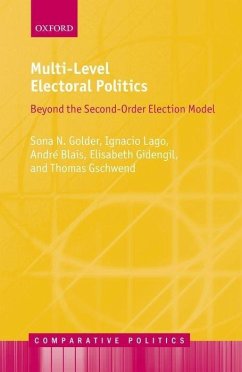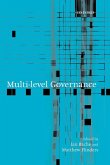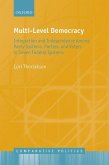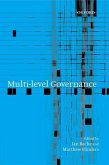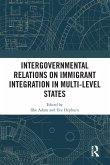- Gebundenes Buch
- Merkliste
- Auf die Merkliste
- Bewerten Bewerten
- Teilen
- Produkt teilen
- Produkterinnerung
- Produkterinnerung
This volume re-examines how the incentives created by specific electoral institutions affect the behaviour of voters and party elites. It provides the first systematic analysis of multi-level politics at three distinct levels: regional, national, and European Parliament elections.
Andere Kunden interessierten sich auch für
![The Theory of Multi-Level Governance The Theory of Multi-Level Governance]() Simona PiattoniThe Theory of Multi-Level Governance192,99 €
Simona PiattoniThe Theory of Multi-Level Governance192,99 €![Multi-Level Governance Multi-Level Governance]() Ian Bache / Matthew Flinders (eds.)Multi-Level Governance75,99 €
Ian Bache / Matthew Flinders (eds.)Multi-Level Governance75,99 €![Multi-Level Governance and European Integration Multi-Level Governance and European Integration]() Liesbet HoogheMulti-Level Governance and European Integration184,99 €
Liesbet HoogheMulti-Level Governance and European Integration184,99 €![Multi-Level Democracy Multi-Level Democracy]() Lori ThorlaksonMulti-Level Democracy149,99 €
Lori ThorlaksonMulti-Level Democracy149,99 €![The UK and Multi-Level Financial Regulation The UK and Multi-Level Financial Regulation]() Scott JamesThe UK and Multi-Level Financial Regulation125,99 €
Scott JamesThe UK and Multi-Level Financial Regulation125,99 €![Multi-Level Governance Multi-Level Governance]() Ian Bache / Matthew Flinders (eds.)Multi-Level Governance276,99 €
Ian Bache / Matthew Flinders (eds.)Multi-Level Governance276,99 €![Intergovernmental Relations on Immigrant Integration in Multi-Level States Intergovernmental Relations on Immigrant Integration in Multi-Level States]() Intergovernmental Relations on Immigrant Integration in Multi-Level States204,99 €
Intergovernmental Relations on Immigrant Integration in Multi-Level States204,99 €-
-
-
This volume re-examines how the incentives created by specific electoral institutions affect the behaviour of voters and party elites. It provides the first systematic analysis of multi-level politics at three distinct levels: regional, national, and European Parliament elections.
Hinweis: Dieser Artikel kann nur an eine deutsche Lieferadresse ausgeliefert werden.
Hinweis: Dieser Artikel kann nur an eine deutsche Lieferadresse ausgeliefert werden.
Produktdetails
- Produktdetails
- Verlag: Oxford University Press (UK)
- Seitenzahl: 224
- Erscheinungstermin: 12. Dezember 2017
- Englisch
- Abmessung: 239mm x 163mm x 33mm
- Gewicht: 748g
- ISBN-13: 9780198791539
- ISBN-10: 0198791534
- Artikelnr.: 48206807
- Herstellerkennzeichnung
- Produktsicherheitsverantwortliche/r
- Europaallee 1
- 36244 Bad Hersfeld
- gpsr@libri.de
- Verlag: Oxford University Press (UK)
- Seitenzahl: 224
- Erscheinungstermin: 12. Dezember 2017
- Englisch
- Abmessung: 239mm x 163mm x 33mm
- Gewicht: 748g
- ISBN-13: 9780198791539
- ISBN-10: 0198791534
- Artikelnr.: 48206807
- Herstellerkennzeichnung
- Produktsicherheitsverantwortliche/r
- Europaallee 1
- 36244 Bad Hersfeld
- gpsr@libri.de
Sona N Golder is Associate Professor of Political Science at the Pennsylvania State University. She is co-editor of the British Journal of Political Science and co-edits the Newsletter for the Comparative Politics groups of the American Political Science Association. Her previous publications include The Logic of Pre-Electoral Coalition Formation (Ohio State University Press, 2006) and Principles of Comparative Politics, 3rd Edition (co-authored with William Roberts Clark and Matt Golder, SAGE/CQ Press, forthcoming). Her research includes political institutions, with a particular interest in electoral coalitions and government formation. Ignacio Lago is Associate Professor of Political Science at Universitat Pompeu Fabra. His research interests include electoral systems, political behaviour and party politics. He has published in numerous scholarly journals such as Public Opinion Quarterly, European Journal of Political Economy, European Journal of Political Research, Electoral Studies, Party Politics and Social Science Quarterly. André Blais is Professor of Political Science at the Université de Montréal. He was one of the co-investigators of the Canadian Election Study from 1988 to 2005. He is the principal co-investigator of the Making Electoral Democracy Work project. His research interests are elections, electoral systems, turnout, public opinion, and methodology. His publications include Voting Experiments (co-edited with Jean-François Laslier and Karine Van der Straeten, Springer, 2016) and To Keep or to Change First Past the Post? (OUP, 2008). Elisabeth Gidengil is Hiram Mills Professor at McGill University and the Centre for the Study of Democratic Citizenship. She studies voting behaviour and public opinion, with particular interests in gender, ethnicity, and political engagement. She was a co-investigator on the Canadian Election Study from 1992 to 2008. She is a past president of the Canadian Political Science Association and a fellow of the Royal Society of Canada. Her publications include Gender and Social Capital (co-edited with Brenda O'Neill, Routledge, 2006), and Canadian Democracy from the Ground Up (co-edited with Heather Bastedo, University of British Columbia Press, 2014). Thomas Gschwend is Professor of Political Science at the University of Mannheim. He studies comparative politics, judicial politics, public opinion, political psychology as well as political methodology. He is particularly interested in the processes by which institutions pre-structure an individual's decision-making process and its consequences for political actors, party strategies, and election outcomes. He is recipient of the Gosnell Prize for Excellence in Political Methodology awarded by the APSA Political Methodology Section. His publications include Strategic Voting in Mixed-Electoral Systems (SFG-Elsevier, 2004) and Research Design in Political Science (co-authored with Frank Schimmelfennig, Palgrave, 2007).
1: Multilevel Governance: An Overview
2: Parties, Voters, and Multi-level Elections: a Conceptual Framework
3: The Institutional and Political Context of Multilevel Elections in France, Germany, and Spain
4: Mobilization in Multi-level Systems
5: Turnout in Multi-level Systems
6: Strategic and Sincere Voting in Multi-Level Systems
7: Accountability across Elections
8: Conclusion
2: Parties, Voters, and Multi-level Elections: a Conceptual Framework
3: The Institutional and Political Context of Multilevel Elections in France, Germany, and Spain
4: Mobilization in Multi-level Systems
5: Turnout in Multi-level Systems
6: Strategic and Sincere Voting in Multi-Level Systems
7: Accountability across Elections
8: Conclusion
1: Multilevel Governance: An Overview
2: Parties, Voters, and Multi-level Elections: a Conceptual Framework
3: The Institutional and Political Context of Multilevel Elections in France, Germany, and Spain
4: Mobilization in Multi-level Systems
5: Turnout in Multi-level Systems
6: Strategic and Sincere Voting in Multi-Level Systems
7: Accountability across Elections
8: Conclusion
2: Parties, Voters, and Multi-level Elections: a Conceptual Framework
3: The Institutional and Political Context of Multilevel Elections in France, Germany, and Spain
4: Mobilization in Multi-level Systems
5: Turnout in Multi-level Systems
6: Strategic and Sincere Voting in Multi-Level Systems
7: Accountability across Elections
8: Conclusion

